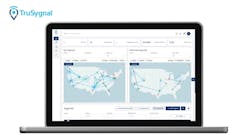IT professionals at LTL carrier Pitt Ohio Express performed a major cleanup of its customer database, slimming its initial 650,000 list—which was riddled with duplicate entries—to 10,000 active customers. The results: Accurate shipping points allow for the building of orderly manifests using routing considerations, and secondly, the carrier now is easily able to identify its most important customers and tailor services accordingly.
“If the driver can quickly find the address of the shipper, he can finish his route in a timely fashion, the freight is returned to the dock and loaded onto a truck for the destination quickly,” Christine Kowalecki Pitt Ohio Express data quality analyst told FleetOwner in an emailed statement. “We meet our times for moving freight from terminal to terminal, allowing our delivery terminals to complete their delivery manifests for the next day. We can avoid unnecessary rushes, extra manpower and trailers in order to make next-day deliveries.”
By cleaning up the redundant data in the database, Pitt Ohio Express has been able to deliver more focused service by recognizing its most valuable customers and delivering additional value to them.
“Quality data allowed us to identify our true customers which allowed marketing to formulate campaigns to different types of customers, based on the type of freight they ship, offering new services to infrequent customers or customized services to our top customers,” Kowalecki explained. “We created a dashboard showing our daily, monthly and yearly standings in a multitude of categories that is updated daily.”
Pitt Ohio Express performed its data cleanup with the assistance of DataFlux, which provided them with a software solution that also ensures that new data meets quality standards before getting entered in the database. The solution, known as dfPower Studio, allowed the LTL to identify duplicate records, verify and merge customer records. Pitt Ohio Express achieved a 99% data consolidation rate with the DataFlux solution.
Each day, the LTL typically processes between 9,000 and 11,000 new invoices, with variations in the customer name or address creating a ‘duplicate’ record for the same customer. Some entities could be represented by dozens of records in the database system.
Pitt Ohio Express drivers typically pick up shipments from 2,500 to 4,500 shippers daily with each shipment having bill of lading. All bills of lading are scanned into the system and turned into freight bills each night. The information contained includes shipper, consignee, billing information, pieces, description and weight. The shipper and consignee have codes assigned to them that include the terminal where the shipment was picked up or going to, part of the company name and zip code. This is where duplication can occur, Kowalecki explained.
It took Pitt Ohio Express five months to implement the dfPower Studio solution. Kowalecki said the company spent this time evaluating which tables it still needed from its old database, which ones needed to be updated and which programs and departments would be affected by the new database.
In Pitt Ohio Express’s case, quality data means accurate shipper, consignee and billing addresses. “A lot of that was building the rules of what data quality is and testing the rules on sample data,” Daniel Teachey, DataFlux spokesman told FleetOwner. “There’s always best practices that’s not been codified. Normally it’s out there in someone’s head but not a tangible asset that’s been spelled out.”
Pitt Ohio Express covers the mid-Atlantic and Great Lake states with 22 terminals.
To comment on this article, write to Terrence Nguyen at [email protected].


